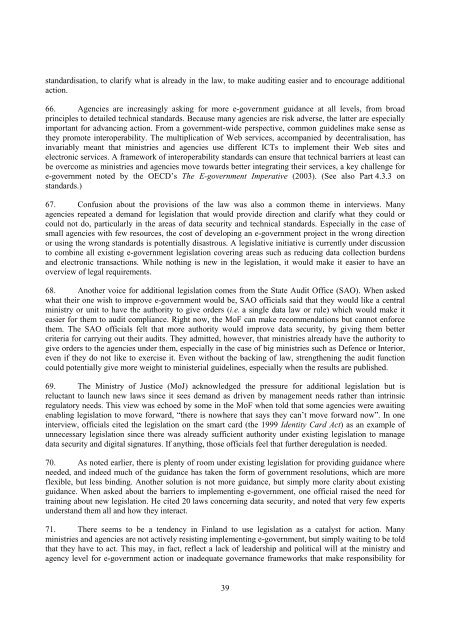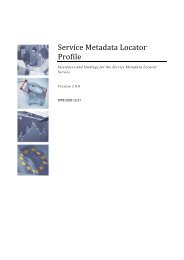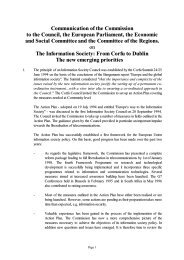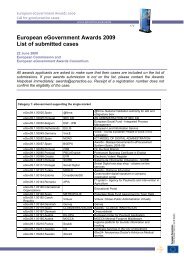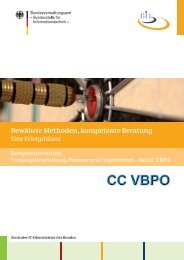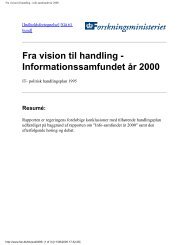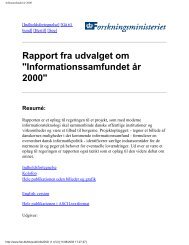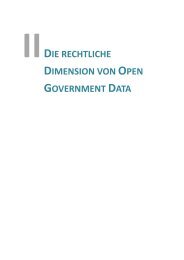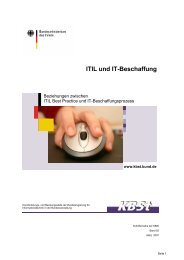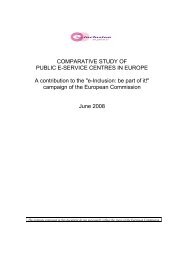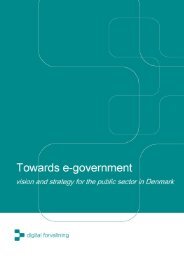e-GOVERNMENT IN FINLAND - ePractice.eu
e-GOVERNMENT IN FINLAND - ePractice.eu
e-GOVERNMENT IN FINLAND - ePractice.eu
You also want an ePaper? Increase the reach of your titles
YUMPU automatically turns print PDFs into web optimized ePapers that Google loves.
standardisation, to clarify what is already in the law, to make auditing easier and to encourage additional<br />
action.<br />
66. Agencies are increasingly asking for more e-government guidance at all levels, from broad<br />
principles to detailed technical standards. Because many agencies are risk adverse, the latter are especially<br />
important for advancing action. From a government-wide perspective, common guidelines make sense as<br />
they promote interoperability. The multiplication of Web services, accompanied by decentralisation, has<br />
invariably meant that ministries and agencies use different ICTs to implement their Web sites and<br />
electronic services. A framework of interoperability standards can ensure that technical barriers at least can<br />
be overcome as ministries and agencies move towards better integrating their services, a key challenge for<br />
e-government noted by the OECD’s The E-government Imperative (2003). (See also Part 4.3.3 on<br />
standards.)<br />
67. Confusion about the provisions of the law was also a common theme in interviews. Many<br />
agencies repeated a demand for legislation that would provide direction and clarify what they could or<br />
could not do, particularly in the areas of data security and technical standards. Especially in the case of<br />
small agencies with few resources, the cost of developing an e-government project in the wrong direction<br />
or using the wrong standards is potentially disastrous. A legislative initiative is currently under discussion<br />
to combine all existing e-government legislation covering areas such as reducing data collection burdens<br />
and electronic transactions. While nothing is new in the legislation, it would make it easier to have an<br />
overview of legal requirements.<br />
68. Another voice for additional legislation comes from the State Audit Office (SAO). When asked<br />
what their one wish to improve e-government would be, SAO officials said that they would like a central<br />
ministry or unit to have the authority to give orders (i.e. a single data law or rule) which would make it<br />
easier for them to audit compliance. Right now, the MoF can make recommendations but cannot enforce<br />
them. The SAO officials felt that more authority would improve data security, by giving them better<br />
criteria for carrying out their audits. They admitted, however, that ministries already have the authority to<br />
give orders to the agencies under them, especially in the case of big ministries such as Defence or Interior,<br />
even if they do not like to exercise it. Even without the backing of law, strengthening the audit function<br />
could potentially give more weight to ministerial guidelines, especially when the results are published.<br />
69. The Ministry of Justice (MoJ) acknowledged the pressure for additional legislation but is<br />
reluctant to launch new laws since it sees demand as driven by management needs rather than intrinsic<br />
regulatory needs. This view was echoed by some in the MoF when told that some agencies were awaiting<br />
enabling legislation to move forward, “there is nowhere that says they can’t move forward now”. In one<br />
interview, officials cited the legislation on the smart card (the 1999 Identity Card Act) as an example of<br />
unnecessary legislation since there was already sufficient authority under existing legislation to manage<br />
data security and digital signatures. If anything, those officials feel that further deregulation is needed.<br />
70. As noted earlier, there is plenty of room under existing legislation for providing guidance where<br />
needed, and indeed much of the guidance has taken the form of government resolutions, which are more<br />
flexible, but less binding. Another solution is not more guidance, but simply more clarity about existing<br />
guidance. When asked about the barriers to implementing e-government, one official raised the need for<br />
training about new legislation. He cited 20 laws concerning data security, and noted that very few experts<br />
understand them all and how they interact.<br />
71. There seems to be a tendency in Finland to use legislation as a catalyst for action. Many<br />
ministries and agencies are not actively resisting implementing e-government, but simply waiting to be told<br />
that they have to act. This may, in fact, reflect a lack of leadership and political will at the ministry and<br />
agency level for e-government action or inadequate governance frameworks that make responsibility for<br />
39


